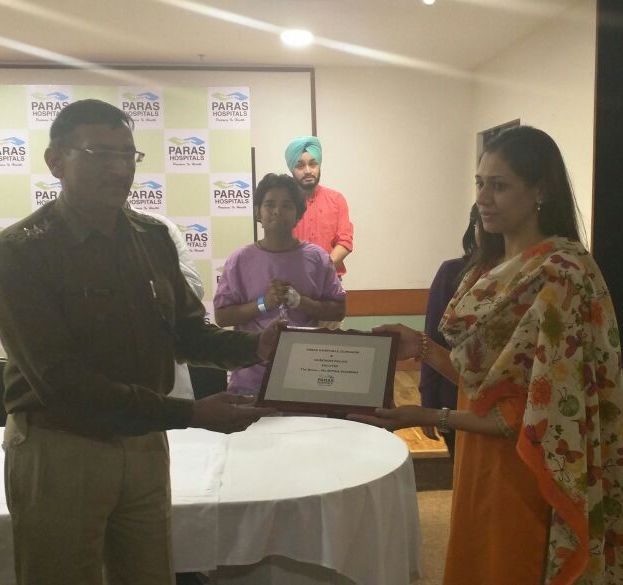Mar 2, 2024
Young Woman Saves Life of Road Accident Victim in City: Paras Hospitals, Gurgaon Honours the Good Samaritan

Navdeep Singh Virk, Commissioner of Police, Gurgaon joins the hospital in felicitating the woman who rushed the victim to hospital without delay
Despite severe traumatic injury, the young man was saved by timely response and medical action within the crucial Golden Hour
Thousands of people in India suffer from severe traumatic injuries every year on deadly Indian roads. However, not many of them survive the mishaps, mostly due to indifference of the witnesses and subsequent delay in getting the right medical attention.
Mohit, 28, a resident of Gurgaon was a fortunate rare case who after having been hit by a car, not only found a noble citizen’s help immediately but also reached the right emergency care at the right time.
Paras Hospitals, Gurgaon today organized a special program to honour the Good Samaritan who by performing her duty to help a fellow human being in need, has set an example for an entire city, which is often derided for its indifference and lack of civic sense. Commissioner of Police, Gurgaon, Mr. Navdeep Singh Virk, joined the ceremony and commended the good work done by the young woman.
Ritika Dhawan (35), was passing by the road near Silver Oak Chowk when a motorcycle-riding Mohit was hit by a car. Without wasting any time, she immediately rushed severely injured Mohit to the emergency department of Paras Hospitals, Gurgaon.
“Mohit was brought to the hospital with severe trauma and in a state of shock; he had a feeble pulse and very low blood pressure. He was aggressively resuscitated and underwent a CT scan which revealed large amount of blood in his abdominal cavity. Realizing he had suffered a potentially life-threatening internal injury, we immediately shifted him to the operation theatre. During surgery, he was found to have approximately 4 liters of blood in the abdominal cavity, a large tear in the right lobe of liver, with the blood vessel supplying the small intestine also torn. Both the injuries were bleeding profusely and even a slight delay in treatment could have proved life-threatening to him. During the immediate surgery, his injuries were repaired meticulously and bleeding was controlled,” said doctors at Paras Hospitals

Postoperatively the patient required multidisciplinary ICU care, ventilatory support and multiple blood transfusions. He is now on his way to recovery.
“It is very encouraging to see a young citizen save the life of a fellow human being. As a society, we need more such socially conscious citizens who can play such positive roles. We often hear and read about road accident victims not being attended to by witnesses and passersby in India. We salute this young woman and want to send out a message to every citizen in the city that they should not think twice before helping people involved in road accidents,” added doctors at Paras Hospitals
Mr. Navdeep Singh Virk also praised the young woman and said the example set by her was worth emulating by everyone.
The case highlights the importance of Golden Hour in case of accident and injury victims. In India, awareness about the importance of Golden Hour is abysmally low.
In emergency medicine, the Golden Hour refers to a time period lasting for one hour, or less, following traumatic injury, during which there is the highest likelihood that prompt medical treatment will prevent death. It is basically a concept that emphasizes the urgency of care required by major trauma patients to prevent early deaths predominantly from bleeding. The patients’ chances of survival are highest if they receive care within a short period of time after a severe injury.
Cases of severe trauma, especially internal bleeding require surgical intervention. Complications such as shock may occur if the patient is not managed appropriately and expeditiously. It therefore becomes a priority to transport patients suffering from severe trauma as fast as possible to specialists, most often found at a hospital trauma center, for definitive treatment. Because some injuries can cause a trauma patient to deteriorate extremely rapidly, the lag time between injury and treatment should ideally be kept to a bare minimum; this has come to be specified as no more than 60 minutes, after which time the survival rate for traumatic patients is alleged to fall off dramatically.

